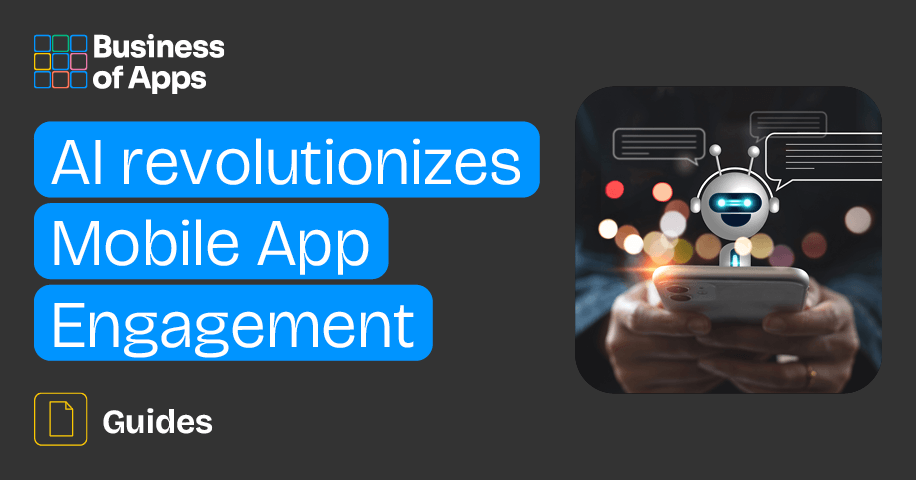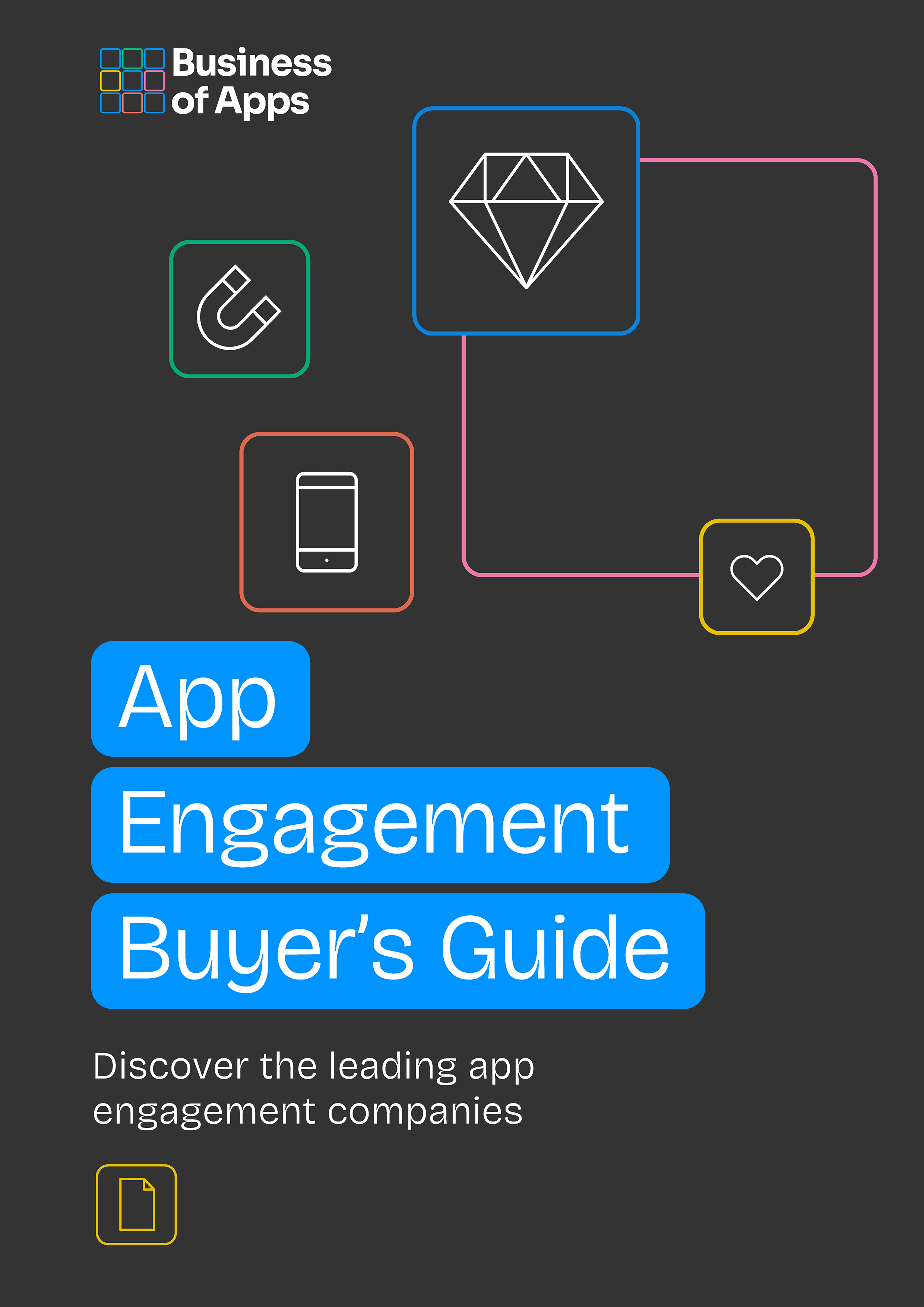
In today’s fiercely competitive mobile app space, user engagement is the foundation of success. Maintaining high levels of user engagement is crucial for ensuring user retention, enhancing your app’s user lifetime value, and reducing churn. Without a stellar plan to engage and retain users long-term, all your marketing and user acquisition efforts will go to waste.
However, achieving and maintaining high user engagement is no easy feat. Market saturation, shifting user preferences, and the sheer volume of available apps make it increasingly challenging to brew the magic potion that will propel your app to the top of the engagement charts.
Over the past few months, artificial intelligence (AI) has become somewhat of a buzzword, not only in app marketing but globally. However, when leveraged properly and to their full potential, AI tools can be a powerful asset in your never-ending quest for high user engagement metrics.
App engagement measures users’ interactions with an app. Engagement is measured by analyzing multiple metrics together to create a comprehensive picture of how often and for how long users interact with an app. To indulge in some generalization, app engagement is essentially a measure of what makes your app successful.
High engagement is typically indicative of better retention rates, greater user satisfaction, and increased revenue. Engaged users are more likely to make in-app purchases, provide positive reviews, and become loyal customers, which significantly impacts an app’s success in an increasingly competitive market. Conversely, low engagement rates suggest there is a problem with your app that you need to quickly identify and address.
Key metrics for gauging app engagement include session length, frequency of use, retention rate, and specific user actions within the app. Understanding these metrics can provide valuable insights into user behavior and help identify areas for improvement. For a deeper dive into these concepts, check out our comprehensive mobile app retention guide.
Download our App Engagement Buyer’s Guide, covering all the trends, strategies, and metrics you need to know to ace app engagement in 2025.App Engagement Buyer's Guide
Challenges in maintaining high app engagement
Maintaining high app engagement is difficult due to several factors:
- Market saturation and cut-throat competition: With millions of apps available, capturing and retaining user attention is increasingly challenging. The sheer volume of available options makes it easy for users to switch to another app if their expectations are not met.
- Changing user preferences: Rapidly evolving user preferences force developers to constantly adapt and update an app’s features and content. Users today expect personalized experiences that cater to their unique needs and wants, and failure to deliver these can lead to high churn rates.
- Content relevance: This should be a no-brainer, but high user engagement requires… well, engaging content that ensures users stay hooked. In other words, keeping content fresh, relevant, and enthralling is a must for success.
- User onboarding: Poor onboarding experiences can also lead to initial drop-offs, making it crucial to ensure a smooth and engaging start for new users.
- Short attention spans: Users increasingly have short attention spans, leading to high churn rates if the app does not provide immediate value. This makes it essential for apps to offer compelling and engaging experiences right from the start.
- User fatigue: Additionally, it’s a fact universally acknowledged that most users receive way too many push notifications these days, which can lead to decreased engagement over time.
- Technical issues: Bugs, slow loading times, and crashes can frustrate users, causing them to abandon the app.
Well, that’s a significant number of challenges marketing teams need to address. Fortunately, emerging AI solutions can help lighten the workload for marketers. These advanced tools can streamline processes, provide deeper insights, and enhance overall efficiency.
AI in app engagement: Use cases
AI has emerged as a game-changer in mobile app engagement. AI technologies can analyze vast amounts of user data, predict behaviors, personalize experiences, and automate interactions, making apps more responsive and engaging.
AI and personalization
Personalized recommendations are a hallmark of AI’s capability to enhance app engagement. By analyzing user data, AI algorithms can suggest content, products, or services tailored to individual preferences. This level of personalization enhances user satisfaction and encourages repeated interactions.
For example, streaming services like Netflix use AI to recommend shows and movies based on viewing history, which significantly boosts user engagement.
Spotify is another great example. It uses AI to create personalized playlists such as “Discover Weekly” based on users’ listening habits. This personalized approach keeps users engaged and encourages them to explore more content, leading to increased session lengths and better user retention.
Content optimization
AI can also help optimize the delivery of content by determining the best times and formats to present information to users. This ensures that content resonates with the target audience.
Predictive analytics
Predictive analytics powered by AI can forecast user behaviors and trends, enabling app developers to proactively address potential issues, reduce churn, and increase user satisfaction. For instance, eCommerce apps can predict which products a user is likely to purchase next and tailor their marketing efforts accordingly.
For instance, Sephora utilizes predictive analytics to predict what products a user might be interested in based on their purchase history, browsing behavior, and even social media interactions. This allows Sephora to offer personalized beauty product recommendations, driving higher engagement, enhancing the shopping experience, and increasing sales.
For another example, think no further than Amazon. Amazon’s AI algorithms analyze patterns in user behavior, such as frequently viewed items, past purchases, and even search queries. By predicting what users are likely to be interested in next, Amazon can present relevant products at the right time, increasing the likelihood of a purchase.
AI automation
AI-driven automation in mobile apps can handle repetitive tasks, provide instant responses to user queries, and streamline user journeys. Chatbots and virtual assistants are prime examples of AI tools that enhance user engagement by offering 24/7 support and personalized interactions.
Useful AI software for app engagement
But, I don’t have the resources or time to build bespoke, in-house AI solutions, I hear you exclaim. And rest assured, I am well aware that very few companies have the resources Amazon does. That’s why I’ve compiled a list of relatively cheap AI software that almost anyone can afford and that will help you take your engagement efforts to the next level.
Personalization AI tools
Personalization tools help tailor the app experience to individual users, increasing engagement by delivering content and recommendations that match their preferences.
Optimizely
- Features: A/B testing, multivariate testing, user segmentation
- Price: Starts at $50/month
Dynamic Yield
- Features: Personalization, recommendations, targeting
- Price: Custom pricing, relatively affordable for small businesses
OneSignal
- Features: Push notifications, email, SMS, in-app messaging with personalization
- Price: Free tier available, paid plans start at $9/month
Braze
- Features: Multi-channel messaging with personalized customer experiences
- Price: Typically ranges from $60,000 to $200,000 per year, depending on the size and specific needs of the organization
Appcues
- Features: Personalized onboarding, user flows, tooltips
- Price: Starts at $249/month
Content optimization tools
Content optimization tools assist in creating, scheduling, and distributing high-quality content across various platforms, ensuring it resonates with the target audience.
Grammarly
- Features: AI-powered writing assistant, grammar and style checks
- Price: Free tier available, premium starts at $12/month
Buffer
- Features: Social media management, content scheduling, analytics
- Price: Free tier available, paid plans start at $15/month
HubSpot
- Features: Email marketing, content creation tools, CRM integration
- Price: Free tier available, paid plans start at $45/month
* HubSpot also offers marketing and sales automation with integrated workflows.
Phrasee
- Features: AI-powered email subject lines, push notifications, social media posts
- Price: Custom pricing
Writesonic
- Features: AI content generation, blog posts, social media content
- Price: Free trial available, paid plans start at $19/month
Predictive analytics
Predictive analytics tools analyze data and predict user behavior, allowing businesses to proactively address potential issues and optimize engagement.
Hootsuite Insights
- Features: Predictive insights and social listening to identify trends
- Price: Free tier available, paid plans start at $19/month
Salesforce Einstein Analytics
- Features: AI-driven insights and data analysis to predict trends and behaviors
- Price: Custom pricing
Amplitude
- Features: Behavioral analytics and predictive insights for user engagement
- Price: Free tier available, paid plans start at $995/month
Pendo
- Features: Product analytics with predictive insights and user feedback
- Price: Custom pricing
Mixpanel
- Features: Advanced product analytics with predictive capabilities
- Price: Free tier available, paid plans start at $25/month
Workflow optimization
Workflow optimization tools automate processes and interactions, enhancing marketing teams’ efficiency.
Tidio
- Features: Integrates chatbots with live chat and email automation to streamline customer interactions and support
- Price: Free tier available, paid plans start at $18/month
Zendesk Answer Bot
- Features: AI chatbot for automating customer support and managing tickets
- Price: Starts at $49/month
Zapier
- Features: Connects apps and automates workflows across platforms
- Price: Free tier available, paid plans start at $19.99/month
Make (formerly Integromat)
- Features: Allows you to visually create, build, and automate workflows
- Price: Free tier available, paid plans start at $9/month
Key takeaways
Leveraging AI software can significantly enhance user engagement by helping marketers automate their workflows and provide more personalized experiences to users. AI tools enable marketers to efficiently manage large volumes of data, uncover hidden patterns, and make data-driven decisions that elevate the overall user experience. Additionally, AI-driven automation can handle repetitive tasks, provide instant responses to user queries, and streamline user journeys, making the app experience more seamless and enjoyable.
Predictive analytics tools allow marketers to anticipate user behavior, helping them address potential issues within an app before they occur. This proactive approach reduces churn and increases user satisfaction. By analyzing historical data and identifying trends, AI can forecast future actions, such as which users are likely to disengage or which features might become popular. This foresight enables marketers to tailor their strategies accordingly, ensuring that they can intervene before problems escalate and keep users engaged.
AI tools also excel at personalization, a key component of user engagement. By leveraging machine learning algorithms, AI can analyze user behavior, preferences, and interactions to deliver highly personalized content, recommendations, and notifications. This level of personalization makes users feel valued and understood, which increases their loyalty to your app.
By integrating AI into your mobile app engagement strategies, you can create more personalized, responsive, and engaging user experiences, ensuring that users remain active and satisfied with your app. This not only improves retention and reduces churn but also maximizes the lifetime value of each user.


